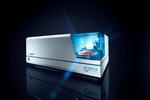Publicly traded company takes over “cytena”
Direktzugriff
Artikelaktionen
Graphics: cytena
The idea of developing a laboratory instrument that handles and sorts individual, viable cells has been realized by researchers in the Laboratory for MEMS Applications in the Department of Microsystems Engineering (IMTEK) at the University of Freiburg. Together with economist Benjamin Steimle and IMTEK academic senior advisor Dr. Peter Koltay, the Department’s former doctoral students Dr. Jonas Schöndube and Dr. André Groß founded the company “cytena GmbH” in 2014. They have produced a laboratory device that isolates, sorts and dispenses individual human cells or bacteria - similar to an inkjet printer. The Swedish publicly traded biotechnology company “CELLINK AB” has now taken over the Freiburg start-up company for 30.25 million euros.
The basic technology goes back to fundamentals that were developed at the Laboratory of MEMS Applications headed by Prof. Dr.-Ing. Roland Zengerle in cooperation with the Hahn-Schickard Institutes between 2000 and 2010, which were further developed in several research projects from 2010 to 2014 up to the prototype stage. The development was supported by several grants from the Federal Ministry of Education and Research, the European Union and, in particular, the EXIST research transfer program and the support of the Technology Transfer Office at the University of Freiburg.
Supported by an automated imaging process, the Single-Cell Printer™ encapsulates cells in microdroplets with a mere 1/10 millimeter diameter and transmits them onto any given examination platform. The patented process is used particularly in research and drug production. Single cells come into play when modern active agents, so-called biologicals, are developed and cell lines are manufactured. Furthermore, scientists need them in order to conduct genetic analysis on individual cells for cancer and stem cell research. With the “cytena” device, scientists can isolate cells for the development of cell lines and build microtissues faster and more reproducibly. The Swedish company “CELLINK AB” sells equipment and technologies for printing and monitoring human tissue and 3D cell culture models.
The start-up company “cytena” is not the first spin-off from Zengerle's applied research. In addition to “cytena,” his laboratory has also given rise to the companies BioFluidix, SpinDiag, Actome and the Freiburg-based Hahn-Schickard-Institut für Mikroanalysesysteme, which has so far provided more than 150 jobs in Freiburg’s technology sector. Another start-up, Dermagnostix, is currently in development.
“Of the three most important ways to transfer our research results into actual applications, spin-offs are the most crucial,” explains Zengerle. The other two paths are scientific publications and direct cooperation with businesses. “However, the findings from publications can be taken up anywhere in the world. The taxpayers’ money that was used for research here in Freiburg then only flows sparsely back into the state or the federal government, for example through license revenues. The same also applies if we cooperate with companies in other European countries, the USA or China and support them in the development of innovative products. In contrast, it goes full circle when we set up companies at the same location where the research is carried out. In that way, the know-how and the high-tech jobs remain in the country and the tax money used for research flows back very efficiently and can drive new innovation forward.”
Contact:
Prof. Dr.-Ing. Roland Zengerle
Department of Microsystems Engineering – IMTEK
University of Freiburg
Tel.: 0761/203-73200
E-Mail: roland.zengerle@imtek.uni-freiburg.de
Fußzeile
Benutzerspezifische Werkzeuge

